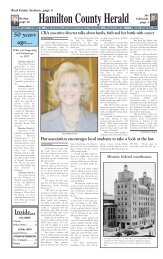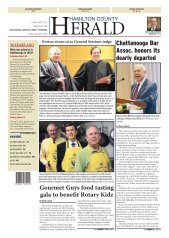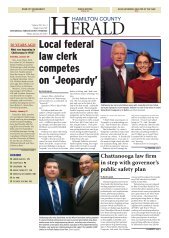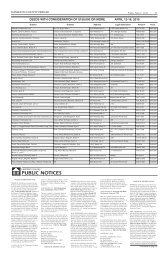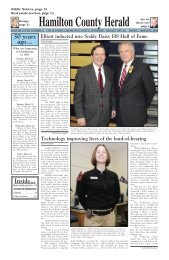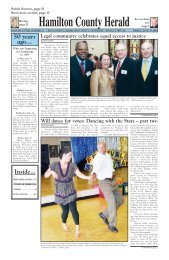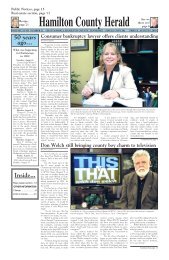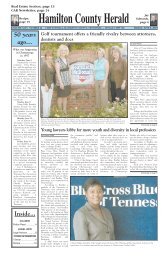50 years ago... Inside... - Chattanooga Bar Association
50 years ago... Inside... - Chattanooga Bar Association
50 years ago... Inside... - Chattanooga Bar Association
You also want an ePaper? Increase the reach of your titles
YUMPU automatically turns print PDFs into web optimized ePapers that Google loves.
2 Friday, February 20, 2009 HAMILTON COUNTY HERALD<br />
Tennessee adds new terms to 2007 judgment against Bayer<br />
Bayer must submit proposed<br />
television ads for its oral contraceptive<br />
“Yaz” to FDA for<br />
approval and must spend $20<br />
million to correct misinformation<br />
from prior television advertisements<br />
as part of a revised<br />
agreement with Tennessee and<br />
27 other states.<br />
Attorney General Bob<br />
Cooper filed on behalf of the<br />
Division of Consumer Affairs a<br />
stipulated supplemental judgment<br />
against Bayer Corporation.<br />
The agreement adds new<br />
requirements to a 2007 judgment<br />
concerning its product<br />
advertising. The 2007 agreement<br />
concerned problems with alleged<br />
deceptive advertising of products<br />
Times are tough and the<br />
Internal Revenue Service knows<br />
people need to save money. Now<br />
that most filers have their W-2s<br />
and are ready to file, here are<br />
some quick tips that may help:<br />
Do your own taxes free. Use<br />
IRS Free File at www.irs.gov to<br />
do your own tax return and e-file<br />
it online at no cost. Filers with<br />
income of $56,000 or less can<br />
use tax software free. Those with<br />
higher incomes can use the new<br />
fillable forms at no cost.<br />
Get free tax preparation and<br />
e-filing. Go to a community help<br />
site staffed by trained volunteers.<br />
Sites will help those with<br />
income under $42,000 or who<br />
including non-disclosure of safety<br />
risks associated with its marketing<br />
of a cholesterol-lowering<br />
drug, Baycol. The judgment<br />
resolves allegations that Bayer’s<br />
2008 marketing of the oral contraceptive<br />
Yaz violated the earlier<br />
agreement.<br />
The supplemental settlement<br />
requires Bayer to submit all<br />
future television Yaz advertisements<br />
to the FDA for review and<br />
comment prior to dissemination;<br />
to comply with all regulatory<br />
comments the FDA makes<br />
regarding the advertising; and in<br />
all Yaz print advertisements, to<br />
clearly and conspicuously disclose<br />
exactly what the drug is<br />
FDA approved for when refer-<br />
file a simple return. Some specialize<br />
in helping seniors. Call 2-<br />
1-1 to find a site in Tennessee.<br />
Get tax credit for home purchase.<br />
Take a tax credit of up to<br />
$7,<strong>50</strong>0 if you bought a home<br />
after April 8, 2008, and had not<br />
owned one for at least three<br />
<strong>years</strong> before the purchase date.<br />
(Note: credit is paid back starting<br />
two <strong>years</strong> later over 15<br />
<strong>years</strong>.)<br />
Qualify for more of last<br />
year’s stimulus payment. Claim<br />
the Recovery Rebate Credit (up<br />
to $600 for individuals, $1,200<br />
for couples) if you didn’t get a<br />
stimulus payment last year or<br />
didn’t get the full amount but<br />
ring to treatment of medical<br />
conditions and their symptoms.<br />
In an earlier warning letter<br />
to Bayer, the FDA addressed two<br />
misleading television ads for Yaz<br />
where Bayer included premenstrual<br />
syndrome (PMS) as a condition<br />
it could be used to treat.<br />
The FDA has not approved Yaz<br />
to treat PMS. The letter also<br />
warned Bayer about promoting<br />
Yaz for types of acne that it is not<br />
approved to treat and for exaggerating<br />
the effects Yaz had on<br />
acne.<br />
“We believe the joint efforts<br />
between the federal government<br />
and the states will help ensure<br />
the public’s safety from misleading<br />
drug advertisements,”<br />
you qualify based on 2008<br />
income. Also, if you had a child<br />
or ceased being a dependent in<br />
2008, you may qualify for this<br />
credit. NOTE: Watch out —<br />
early returns show lots of errors<br />
on this one! You’ll need to enter<br />
the correct amount of your 2008<br />
stimulus payment to calculate<br />
this credit.<br />
Income down in 2008? See<br />
if you qualify for Earned Income<br />
Tax Credit. A married couple filing<br />
jointly with income under<br />
$42,000 and two or more children<br />
could qualify for up to<br />
$4,824.<br />
(NEW) Deduct your real<br />
Cooper said.<br />
Tom Abrams, director of<br />
the FDA’s Division of Drug<br />
Marketing, Advertising and<br />
Communications, added, “This<br />
is a great example of collaboration<br />
between the FDA and state<br />
attorneys general. By working<br />
together, we can achieve excellent<br />
results and double our<br />
efforts to clean up misleading<br />
advertising in the marketplace.<br />
This significantly benefits the<br />
public by ensuring that consumers<br />
are not misled about<br />
information relating to their<br />
health.”<br />
In addition to changes in<br />
its advertising policies, Bayer<br />
IRS offers quick tips to help taxpayers save money<br />
estate taxes. Own a home but<br />
can’t itemize deductions? Add<br />
your real estate taxes to your<br />
standard deduction — up to an<br />
extra $<strong>50</strong>0 for individuals,<br />
$1,000 for married couples filing<br />
jointly.<br />
Get your money faster.<br />
With e-file and direct deposit,<br />
your tax refund can be in your<br />
bank account in 10 days or less.<br />
Get free help and forms.<br />
Don’t be confused by internet<br />
sites that end in .com, .net, .org<br />
or other designations instead of<br />
.gov that may charge for tax<br />
services the IRS provides at no<br />
cost. The address of the official<br />
also must conduct a $20 million<br />
corrective advertising program<br />
to remedy misinformation from<br />
the misleading YAZ advertisements.<br />
Consumers wanting more<br />
information on this case should<br />
to http://state.tn.us/attorneygeneral/cases/bayer/bayer.htm.<br />
Additionally, consumers are<br />
encouraged to report other<br />
consumer complaints by contacting<br />
the Tennessee Division<br />
of Consumer Affairs by calling<br />
toll-free in Tennessee (800) 342-<br />
8385 or going online to<br />
www.tennessee.gov/consumer.<br />
Source: Office of the Attorney<br />
General ❖<br />
IRS Web site is www.irs.gov.<br />
Watch out for scams in your<br />
inbox. Don’t add ID theft to<br />
your financial woes! IRS never<br />
sends e-mails about your taxes.<br />
No matter how real or official it<br />
may look, don’t respond and<br />
don’t click on any links or open<br />
any attachments. See IRS.gov<br />
for details.<br />
There may be no need to<br />
hire someone to resolve an IRS<br />
problem. If going through the<br />
normal IRS channels has not<br />
worked, contact the Taxpayer<br />
Advocate Service toll-free at 1-<br />
877-777-4778.<br />
Source: IRS ❖<br />
Ruling by U. S. Supreme Court may extend beyond ‘good faith’ cases<br />
by Todd C. Berg, Esq.<br />
The Daily Record Newswire<br />
A new U.S. Supreme Court<br />
exclusionary rule analysis may make<br />
it more difficult for criminal defendants<br />
to suppress evidence that was<br />
unconstitutionally seized by the<br />
police.<br />
And, even though the court’s<br />
announcement came in a ruling that<br />
reads like a “good-faith exception”<br />
opinion, criminal-law specialists say<br />
the revamped analysis may apply to<br />
more than just good-faith exception<br />
cases.<br />
In Herring v. U.S., the Supreme<br />
Court refused to apply the exclusionary<br />
rule to suppress drugs and a gun<br />
seized from Bennie Dean Herring<br />
after a police record-keeping error<br />
caused the Coffee County, Ala.,<br />
Sheriff’s Department to arrest and<br />
search Herring based on a warrant<br />
that had been recalled five months<br />
earlier.<br />
Writing in January for a five-justice<br />
majority, Chief Justice John G.<br />
Roberts Jr. said application of the<br />
exclusionary rule was unwarranted<br />
because the police’s violation of<br />
Herring’s Fourth Amendment rights<br />
to be free from unreasonable searches<br />
and seizures was merely “the result of<br />
isolated negligence attenuated from<br />
the arrest.”<br />
To trigger the exclusionary rule,<br />
Roberts wrote, the police misconduct<br />
must be deliberate, reckless, grossly<br />
negligent or the result of “recurring or<br />
systemic negligence.”<br />
None of those descriptions<br />
applied to the police misconduct in<br />
Herring’s case, Roberts said.<br />
When “police mistakes are the<br />
result of negligence such as that<br />
described here, rather than systemic<br />
error or reckless disregard of constitutional<br />
requirements,” he said, the<br />
police’s violation of a defendant’s<br />
constitutional rights is “not so objectively<br />
culpable as to require exclusion.”<br />
Before Herring, the Supreme<br />
Court had not ruled out application<br />
of the exclusionary rule as a sanction<br />
for police negligence; nor had the<br />
court required deliberate, reckless, or<br />
grossly negligent police misconduct<br />
or “recurring or systemic negligence”<br />
as a prerequisite to evidence suppression.<br />
Instead, objective reasonableness<br />
was the standard. In a line of<br />
cases that started with a 1984 decision,<br />
U.S. v. Leon, the Supreme<br />
Court recognized a good-faith exception<br />
to the exclusionary rule for constitutional<br />
violations that resulted<br />
from the police’s “objectively reasonable<br />
reliance” on warrants and<br />
statutes that later turned out to be<br />
invalid. The court reasoned that, if<br />
the police had acted “objectively reasonably,”<br />
then there was no misconduct<br />
for evidence suppression to<br />
deter.<br />
Roberts didn’t refer to Herring<br />
as a good-faith exception case, but he<br />
did rely on the good-faith exception<br />
line of cases in reaching his conclusion.<br />
He also said the purpose of the<br />
“judicially created” exclusionary rule<br />
was to deter the police from committing<br />
future Fourth Amendment violations.<br />
The rule’s deterrent effect is<br />
usually accomplished, Roberts said,<br />
by suppressing evidence the police<br />
seized unconstitutionally.<br />
Justices Antonin Scalia,<br />
Anthony M. Kennedy, Clarence<br />
Thomas and Samuel A. Alito Jr.<br />
joined Roberts’ majority opinion.<br />
Justices John Paul Stevens, David<br />
Souter and Stephen Breyer joined<br />
Justice Ruth Bader Ginsburg’s dissent.<br />
Assistant Wayne County<br />
Prosecutor Timothy A. Baughman,<br />
who persuaded the Michigan<br />
Supreme Court to adopt the “goodfaith<br />
exception” to the exclusionary<br />
rule in People v. Goldston in 2005,<br />
SSubscribe u b s c r i b e<br />
ttoday o d a y ! !!! ! !<br />
said the Herring opinion appears to<br />
give prosecutors an effective weapon<br />
for defeating a defendant’s bid to<br />
apply the exclusionary rule.<br />
There “are certainly many situations<br />
where the police may make a<br />
‘reasonable’ error, [but it] could not be<br />
characterized as deliberate, grossly<br />
negligent or the result of systemic<br />
negligence,” he said.<br />
Professor David A. Moran, who<br />
is one of the co-founders of the<br />
University of Michigan Law School’s<br />
Innocence Clinic and who has<br />
argued and won before the U.S.<br />
Supreme Court, said Herring could<br />
make life easier for prosecutors.<br />
And, consequently, he said, the<br />
ruling could also make it more difficult<br />
for criminal defendants who are<br />
trying to use the exclusionary rule to<br />
suppress unconstitutionally obtained<br />
evidence.<br />
• • • $15 for one year • • •<br />
“A lot of police mistakes are the<br />
result of negligence,” Moran said,<br />
which means that, under Herring,<br />
they wouldn’t trigger the exclusionary<br />
rule.<br />
Conversely, he said, the “number<br />
of cases in which a deliberate violation<br />
of constitutional rights can be<br />
proved is pretty small.”<br />
Moran said the Supreme<br />
Court’s conclusion that police negligence<br />
is insufficient to trigger the<br />
exclusionary rule shows the court’s<br />
“determined effort to very significantly<br />
weaken the exclusionary rule.”<br />
The majority is laying the<br />
groundwork for “future expansion of<br />
non-exclusion under the exclusionary<br />
rule,” he said.<br />
Although Herring was decided<br />
in the context of a police record-<br />
Republic Centre<br />
633 Chestnut Street, Suite 600<br />
<strong>Chattanooga</strong>, Tennessee 374<strong>50</strong><br />
Telephone 423-267-8323<br />
Fax 423-266-6784<br />
Subscribe TODAY... It’s easy!<br />
Send no money now. Simply fax or mail this form to us. We’ll bill you later.<br />
Company Name<br />
Attention Bus. Phone<br />
Address<br />
Hamilton County Herald<br />
City ST Zip<br />
Continued on page 3



